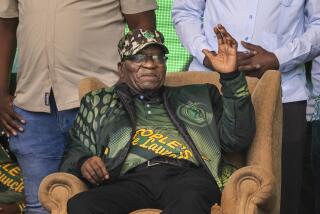South Africa court sets post-election trial date for Jacob Zuma
- Share via
JOHANNESBURG, SOUTH AFRICA — South Africa’s high court on Wednesday set an August trial date for Jacob Zuma, leader of the nation’s ruling party -- meaning the country may see its next president tried while in office on charges of graft, fraud and corruption.
Despite the charges, the dominant African National Congress is sticking with Zuma as its candidate, making it all but certain he’ll be the country’s president after elections, expected to be held in April.
The charges relate to a multibillion-dollar arms deal in the 1990s. Zuma is hoping to avoid trial by seeking a permanent stay of prosecution. If that fails, the ANC could vote in Parliament to grant him immunity from prosecution as national president -- if it wins the two-thirds majority needed to change the constitution. Zuma was acquitted of rape charges in 2006.
Critics question the ANC’s commitment to the rule of law and accuse Zuma of doing everything in his power to avoid standing trial.
Analysts fear South Africa’s fragile judicial independence could collapse. They also warn that a lengthy trial could distract Zuma from running the state and undermine the office of president.
Political analyst William Gumede said the ANC’s national executive committee was using all its resources in trying to find a political solution to get Zuma off the hook.
“This is a major crisis. It’s not going to go away,” Gumede said. “Every court case will open up a new front, and it will become more and more damaging to the ANC as information emerges.”
He said Zuma’s supporters, who had already threatened to “kill for Zuma” and make the country ungovernable, were unlikely to accept a conviction.
“If Zuma as president is convicted, the battle to find a solution then is going to be more brutal and more bloody,” Gumede said.
Under Zuma’s leadership, the ANC has become so identified with his legal battles that the party used Zuma’s Wednesday court appearance to stage a rally outside the court in Pietermaritzburg, 280 miles southeast of Johannesburg.
Mark Gevisser, author of “A Legacy of Liberation: Thabo Mbeki and the Future of the South African Dream,” said the ANC had made Zuma’s personal problems its own by insisting that he become president.
“They’ve tied their fortunes to his fortunes in court, and that’s potentially a very dangerous situation,” Gevisser said. “It means it’s in the party’s interests to have the charges against him withdrawn, which means that the leadership of the ruling party is acting in its own interests, rather than the interests of the rule of law.”
Zuma has said the charges are part of a conspiracy against him by prosecutors and his political enemies.
“What has happened to me is that certain people have thrown this dark cloud to me with the aim of demonizing me,” Zuma said at the rally outside the court. “So if I step aside, a bad precedent will be created. People will know that if you hate somebody, you just throw a dark cloud and it is the end of the story. I am not going to step aside simply because I have not been found guilty by any court of law.”
The case has been delayed for years partly by Zuma’s appeals, designed to exclude evidence that the prosecution says is key to the case.
An internal ANC battle over Zuma’s presidential bid triggered a split in the party last year. His supporters toppled Thabo Mbeki as president when a high court judge threw out fraud and racketeering charges against Zuma, saying he might have been a victim of a political conspiracy. The Supreme Court of Appeal overturned that judgment last month.
Critics of the ANC are alarmed by the party’s pressure on state prosecutors: The government recently disbanded the Scorpions -- the crack anti-corruption unit that charged and prosecuted Zuma. President Kgalema Motlanthe, a Zuma ally, recently fired the boss of the National Prosecuting Authority, Vusi Pikoli, even though an independent inquiry had cleared him of wrongdoing.
South African newspapers report that Motlanthe could name a former member of Zuma’s defense team as Pikoli’s replacement, opening the possibility that the National Prosecuting Authority could simply abandon the trial.
Helen Zille, the leader of the opposition Democratic Alliance, said last week that such a development would trigger a constitutional crisis.
“The most galling aspect of Zuma’s campaign to avoid justice,” she said in an online newsletter, “is the way in which he and the ANC have undermined the constitution and its institutions in the interests of self-preservation.”
--
More to Read
Sign up for Essential California
The most important California stories and recommendations in your inbox every morning.
You may occasionally receive promotional content from the Los Angeles Times.













